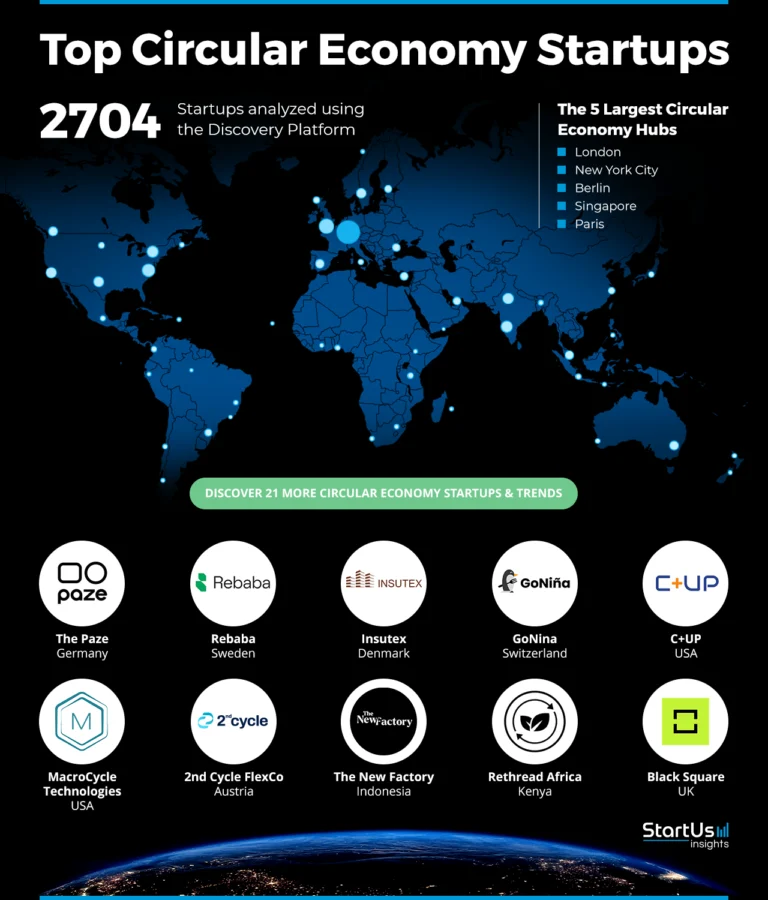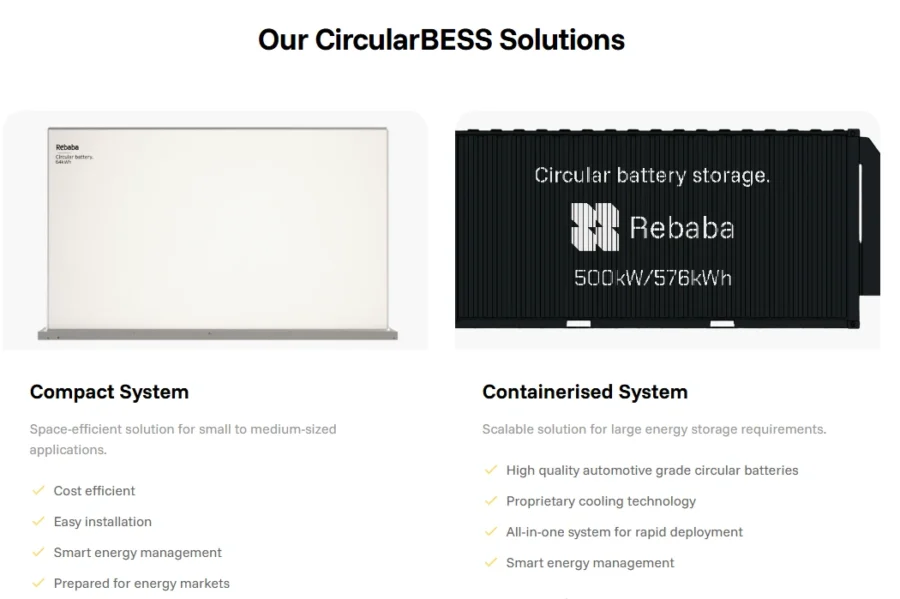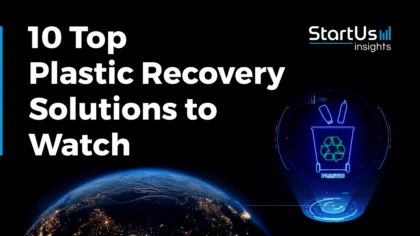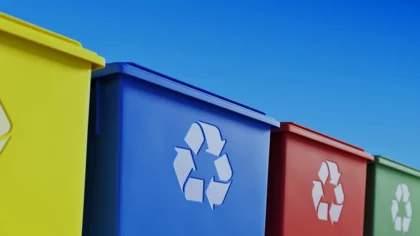Accelerate Productivity in 2025
Reignite Growth Despite the Global Slowdown
Circular economy startups are reshaping how industries produce, consume, and recover materials by building scalable solutions that reduce waste, extend product life cycles, and regenerate resources. From circular packaging and food waste valorization to battery reuse and textile upcycling, these ventures address critical environmental and supply chain challenges.
In this article, we spotlight 10 circular economy startups poised to redefine material flows and sustainability in 2025. Selected for their technologies, commercial traction, and climate impact potential, these companies are paving the way toward a regenerative and resource-resilient future.
Global Startup Heat Map highlights 10 Circular Economy Startups to Watch
Through the Big Data & Artificial Intelligence (AI)-powered StartUs Insights Discovery Platform, covering over 7M+ startups, 20K+ technology trends plus 150M+ patents, news articles & market reports, we identified 10 circular economy startups.
The Global Startup Heat Map below highlights the circular economy startups you should watch in 2025, as well as the geo-distribution of 2700+ circular economy companies & scaleups we analyzed for this research.
According to our data, we observe high startup activity in the US and India, followed by the UK. The top 5 Startup Hubs for the circular economy are London, New York City, Berlin, Singapore, and Paris.

Discover Emerging Circular Economy Startups to Watch in 2025
We hand-picked startups to showcase in this report by filtering for their technology, founding year, location, funding, and other metrics. These circular economy startups work on solutions ranging from circular packaging and upcycled solar modules to food waste management and circular plastics.
- The Paze – Circular Packaging
- Rebaba – Circular Battery System
- Insutex – Construction Materials
- GoNina – Food Waste Management
- C+UP – Carbon Capture and Utilization
- MacroCycle Technologies – Circular Plastics
- 2nd Cycle FlexCo – Upcycled Solar Modules
- The New Factory – Textile Upcycling
- Rethread Africa – Waste to Materials
- Black Square – Material and Energy Recovery
1. The Paze
- Founding Year: 2023
- Location: Stuttgart, Germany
- Use For: Packaging-as-a-Service
The Paze offers zero-waste packaging-as-a-service for online retailers. It uses its patented Aero-Flex technology to develop an automated inflatable packaging solution that adjusts to the shape of the product inside it. This reduces the packaging dimensions, leading to lower shipping costs.
The Paze Pack is reusable for up to a hundred cycles, thereby reducing the environmental impact. It is also stackable and nestable, which improves efficiency in storage and transportation.
2. Rebaba
- Founding Year: 2023
- Location: Stockholm, Sweden
- Use For: Battery Energy Storage
Rebaba repurposes retired electric vehicle (EV) batteries into circular battery energy storage systems (BESS). EV batteries retain around 80% of their original capacity at the end of their first life. The startup leverages this opportunity to reduce production for new batteries while maximizing existing potential.

It deploys proprietary fireproof cooling technology with advanced temperature control for battery reuse. The company’s circular BESS solutions provide flexible sizing options. For example, the compact energy storage (40-80 kWh) is suitable for load shifting, local generation storage, peak shaving, grid services, and backup power, for offices, residential, and smaller industrial facilities.
Another solution, the containerized battery system (up to 600 kWh), is scalable and suitable for large-scale energy storage applications. This way, the startup ensures more sustainable, ethical, and energy-efficient battery production as the traditional practices are resource-intensive and over-exploitative of minerals.
3. Insutex
- Founding Year: 2023
- Location: Copenhagen, Denmark
- Use For: Insulation Materials
Insutex recycles textile waste from discarded clothing, production scraps, and unsold inventory. It converts this waste into insulation materials for the construction industry. This way, it reduces the carbon emissions in the textile and construction industries.
The resulting materials are suited for wall insulation of roofs and ceilings without causing inconvenience. The startup’s granular insulation materials are also suitable for post-insulation and pre-fabricated elements.
4. GoNina
- Founding Year: 2023
- Location: Zurich, Switzerland
- Use For: Surplus Food Management
GoNina develops an AI-based prediction app to combat food waste. It allows restaurants, bakeries, supermarkets, and other vendors to sell their surplus and close-to-expiration food to consumers at a discounted price.
The forecasting app deploys machine learning and deep learning algorithms. They combine data from multiple sources such as historical sales, time patterns from point of sale (POS) systems, weather, events, and more. This facilitates improved accuracy in predicting food waste. Better management of food waste further reduces greenhouse gas emissions.
5. C+UP
- Founding Year: 2023
- Location: Chicago, Illinois, USA
- Use For: Sustainable Fuels
C+UP upcycles industrial carbon emissions into sustainable fuels and chemical feedstocks. Its proprietary power-to-X (P2X) process captures carbon from industrial processes. This CO2 is converted to useful chemicals like propane, propanol, propylene, and ethylene, using renewable electricity and water.
Sustainable propane, for example, functions as a feed for petrochemical processes to produce propylene or ethylene, which are the building blocks of plastics, fibers, rubbers, and more. It also serves as a sustainable alternative fuel. This allows industries like agriculture, transportation, energy, and cement to implement carbon-negative supply chains.
Want to Explore 2700+ Circular Economy Startups & Scaleups?
6. MacroCycle Technologies
- Founding Year: 2023
- Location: Cambridge, MA, USA
- Use For: Circular Plastics
MacroCycle Technologies recycles plastic and polyester waste into virgin-grade plastics with lowered Scope 3 emissions. It upcycles polyethylene terephthalate (PET or PETE) and polyester resins based on the synthesis of cyclic macromolecules.
The startup’s technology uses less energy than conventional plastic recycling processes. This reduces the amount of plastics ending up in landfills and oceans while mitigating air, soil, and water pollution.
7. 2nd Cycle FlexCo
- Founding Year: 2024
- Location: Amstetten, Austria
- Use For: Refurbished Photovoltaic (PV) Modules
2nd Cycle FlexCo is working on an automated plant to upcycle solar modules. The plant refurbishes the PV modules through processes like identification of module type, wet cleaning, condition testing, and replacement of damaged components. This facilitates the reintegration of functional modules for a second life cycle and reduces photovoltaic waste and carbon emissions.
8. The New Factory
- Founding Year: 2023
- Location: Bandung, Indonesia
- Use For: Textile Upcycling
The New Factory converts textile waste into new recycled materials. The startup recovers textile waste from industries and consumers, and recycles it to create merchandise and fashion products. This prevents the waste from ending up in landfills and causing pollution. It also cuts demand for raw materials and energy-intensive manufacturing.
9. Rethread Africa
- Founding Year: 2023
- Location: Nairobi, Kenya
- Use For: Waste to Materials
Rethread Africa converts agricultural waste into eco-friendly biomaterials for the fashion industry. It sources byproducts, like sugarcane bagasse, from smallholder farmers to produce polyester alternatives like polyhydroxyalkanoates (PHA).
The material is recyclable multiple times and naturally decomposes if discarded. This reduces the environmental impact and enhances the economic stability of local farming communities.
Another solution, CottonCycle, recycles post-consumer polyester and cellulose using hydrothermal and dissolution treatment on cotton and polyester blends. The resulting rPET and cellulosic superabsorbent polymer (C-SAP) curb fossil fuel consumption and the textile industry’s carbon footprint.
Moreover, C-SAP enhances the water retention capacity of cotton, thereby improving soil moisture and boosting cotton yields in water-scarce regions.
10. Black Square
- Founding Year: 2023
- Location: London, UK
- Use For: Material and Energy Recovery
Black Square promotes material and energy recovery from waste and end-of-life products. Its AI platform, Circle, maps waste flows through supply chains and evaluates the financial viability of recycling projects for industries.
The platform allows stakeholders to visualize and evaluate recycling costs associated with logistics, transportation, feedstocks, landfills, and more. This facilitates data-driven investments and operational decision-making for municipal waste collectors, footwear recyclers, consumer electronics, and plastic industries.
Discover All Emerging Circular Economy Startups
The Circular Economy startups showcased in this report are only a small sample of all startups we identified through our data-driven startup scouting approach. Download our free Circular Economy Innovation Report for a broad overview of the industry or get in touch for quick & exhaustive research on the latest technologies & emerging solutions that will impact your company in 2025!



![Explore the Top 10 Waste Management Industry Trends & Innovations [2025]](https://www.startus-insights.com/wp-content/uploads/2025/06/Waste-Management-Industry-Trends-SharedImg-StartUs-Insights-noresize-420x236.webp)

![Explore the Top 10 Circular Economy Trends & Innovations [2025]](https://www.startus-insights.com/wp-content/uploads/2025/03/Circular-Economy-Trends-SharedImg-StartUs-Insights-noresize-420x236.webp)



